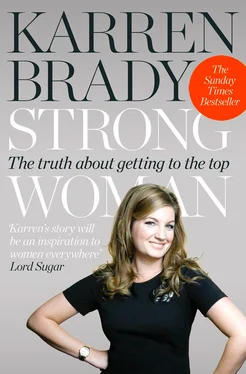I fear that talented people with great personal qualities won’t get a chance. Not everyone wants to go to university, but many companies believe that if you have a university degree you’re far more intelligent than someone who hasn’t. That’s not always the case. Life experience gives you the ability to think for yourself, the energy to provide for yourself and the desire to champion yourself.
Added to that, there’s also a snobbery about which university you’ve been to. Young people could spend all that money and find that companies still turn their noses up at them because they’ve been to the wrong institution or chosen the wrong course. Despite all the talk about the glass ceiling, I think the biggest obstacle to entry into an organisation is the HR director. When you apply to a company now your CV goes into one of two piles – university, yes; non-university, no. And that definitely comes from HR.
But with the increased costs of university, so many people can’t afford to go or are so fearful of debt that they won’t go. And what happens to them? Either they have to be motivated enough to work for themselves, to come up with an idea and drive it forward, or they have to start at the absolute bottom and hope they’ll find someone who notices their ability and is prepared to push them forward.
Companies will need to be more and more open-minded to unearth the right talent. At one point in my career I was offered a job as vice-president of a major IT company in Europe, which sounded great – on paper. Then they asked me to go to America for six months to complete an induction into their company. My response was, ‘Why would you want to turn me into someone who has the same mind-set as everybody else who works for you? Surely it is better to have diversity.’ But they were adamant: that was what they wanted. And, ultimately, it wasn’t me.
On a more positive note, apprenticeships are a great way forward: you earn while you learn and you learn on the job. It’s also an opportunity for the company, as the apprentices are with you from the outset and they become used to your way of doing things. Then, at the end of the process, they have a practical skill.
As well as looking past the letters – or lack of them – after your name, sexist stereotyping is another area that should be tackled to make sure the best women can rise to the top. We might think there is no sexism today, but there is. Strikingly, while I have rarely experienced it at work, I get it all the time from the media. If you look on Internet message boards, the abuse is always targeted at my gender: ‘Oh, that Karren Brady, she can motivate the team – she knows how to put a spring in their step, nudge nudge.’ They’d never say anything so personal about a male director, they would simply say he was really bad at his job.
Without a doubt, the hardest thing about being a female executive in the spotlight is that your gender makes you an easy target. Many women perhaps couldn’t cope with some of the stuff I’ve had thrown at me, and I wouldn’t blame them. Luckily, I have a very thick skin and I hope via this book to help you develop one, too. It can be achieved. You’ll likely need it too, with the guilt the media encourages in working mothers. Newspapers will publish the research that fits their particular viewpoint – you know the headlines, they’re the ones along the lines of ‘Working mothers’ children die young’ or ‘Working mothers’ children are dyslexic/stupid/earn less money.’ Either that, or it’s stories about superwomen who have five children, a million-pound job and do it all perfectly – and, believe me, those stories are always misleading. Still, women measure themselves against them.
Then there’s still this sense that if you have a career, children and a nanny, you’re some sort of ruthless bitch who doesn’t give a damn about anyone but yourself. That you just drop your kids off whenever it suits you and do as you like. That’s hard for women to cope with. And it just is not true. Working women are weighed down with the guilt, either that they weren’t at sports day or that they missed the board meeting. I want to help women to understand that you can only do what you can do. The balance is different for everyone.
What can I bring to this debate? Lessons born of hard-won experience. I am independent, driven and motivated. I have taught myself to rely on no one but myself. I don’t pretend to be someone I’m not. I have self-esteem, and I know that I’m capable of achieving anything I put my mind to. Yet, as you’ll read in this book, I never thought it would all turn out as it has. It’s not been easy, and sometimes it’s been punishing. But the result of 25 years’ hard work is that I’m fortunate: I have a career I love.
And that comes with a warning. I did not wake up at the age of 42 and parachute into this position. I’ve worked hard, sacrificed a lot, and all the time I’ve been in pursuit of success. Yet I can say, with my hand on my heart, that it’s been worth it. That’s why I hope to inspire you not to feel guilty for having a dream, for having ambition and not being afraid to go out there to do something about it. To turn your dream into reality.
After all, if you don’t champion your career, who will do it for you?
I want to make things better for my daughter, for you and yours.
Конец ознакомительного фрагмента.
Текст предоставлен ООО «ЛитРес».
Прочитайте эту книгу целиком, купив полную легальную версию на ЛитРес.
Безопасно оплатить книгу можно банковской картой Visa, MasterCard, Maestro, со счета мобильного телефона, с платежного терминала, в салоне МТС или Связной, через PayPal, WebMoney, Яндекс.Деньги, QIWI Кошелек, бонусными картами или другим удобным Вам способом.












